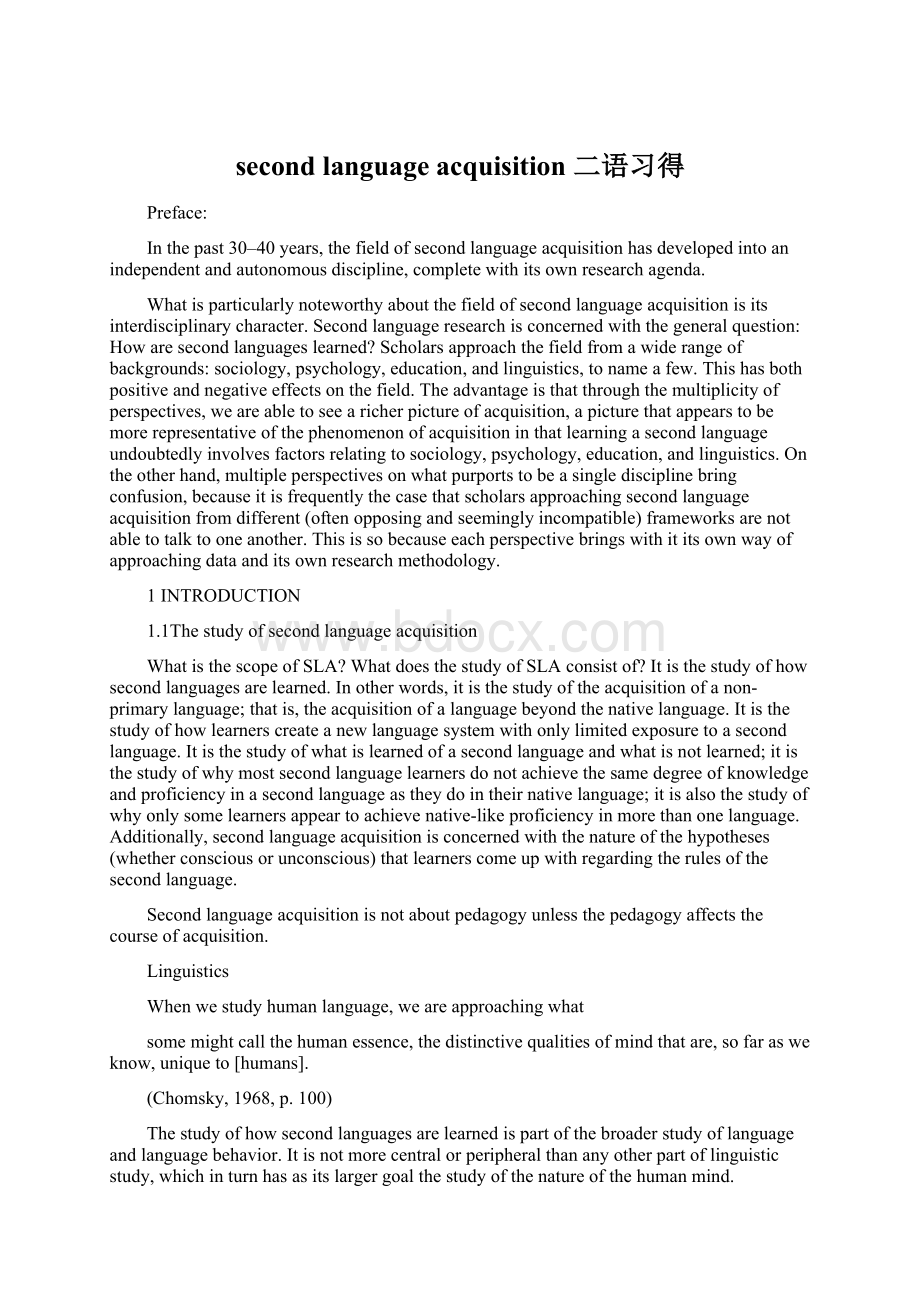second language acquisition 二语习得.docx
《second language acquisition 二语习得.docx》由会员分享,可在线阅读,更多相关《second language acquisition 二语习得.docx(30页珍藏版)》请在冰豆网上搜索。

secondlanguageacquisition二语习得
Preface:
Inthepast30–40years,thefieldofsecondlanguageacquisitionhasdevelopedintoanindependentandautonomousdiscipline,completewithitsownresearchagenda.
Whatisparticularlynoteworthyaboutthefieldofsecondlanguageacquisitionisitsinterdisciplinarycharacter.Secondlanguageresearchisconcernedwiththegeneralquestion:
Howaresecondlanguageslearned?
Scholarsapproachthefieldfromawiderangeofbackgrounds:
sociology,psychology,education,andlinguistics,tonameafew.Thishasbothpositiveandnegativeeffectsonthefield.Theadvantageisthatthroughthemultiplicityofperspectives,weareabletoseearicherpictureofacquisition,apicturethatappearstobemorerepresentativeofthephenomenonofacquisitioninthatlearningasecondlanguageundoubtedlyinvolvesfactorsrelatingtosociology,psychology,education,andlinguistics.Ontheotherhand,multipleperspectivesonwhatpurportstobeasingledisciplinebringconfusion,becauseitisfrequentlythecasethatscholarsapproachingsecondlanguageacquisitionfromdifferent(oftenopposingandseeminglyincompatible)frameworksarenotabletotalktooneanother.Thisissobecauseeachperspectivebringswithititsownwayofapproachingdataanditsownresearchmethodology.
1INTRODUCTION
1.1Thestudyofsecondlanguageacquisition
WhatisthescopeofSLA?
WhatdoesthestudyofSLAconsistof?
Itisthestudyofhowsecondlanguagesarelearned.Inotherwords,itisthestudyoftheacquisitionofanon-primarylanguage;thatis,theacquisitionofalanguagebeyondthenativelanguage.Itisthestudyofhowlearnerscreateanewlanguagesystemwithonlylimitedexposuretoasecondlanguage.Itisthestudyofwhatislearnedofasecondlanguageandwhatisnotlearned;itisthestudyofwhymostsecondlanguagelearnersdonotachievethesamedegreeofknowledgeandproficiencyinasecondlanguageastheydointheirnativelanguage;itisalsothestudyofwhyonlysomelearnersappeartoachievenative-likeproficiencyinmorethanonelanguage.Additionally,secondlanguageacquisitionisconcernedwiththenatureofthehypotheses(whetherconsciousorunconscious)thatlearnerscomeupwithregardingtherulesofthesecondlanguage.
Secondlanguageacquisitionisnotaboutpedagogyunlessthepedagogyaffectsthecourseofacquisition.
Linguistics
Whenwestudyhumanlanguage,weareapproachingwhat
somemightcallthehumanessence,thedistinctivequalitiesofmindthatare,sofarasweknow,uniqueto[humans].
(Chomsky,1968,p.100)
Thestudyofhowsecondlanguagesarelearnedispartofthebroaderstudyoflanguageandlanguagebehavior.Itisnotmorecentralorperipheralthananyotherpartoflinguisticstudy,whichinturnhasasitslargergoalthestudyofthenatureofthehumanmind.
Languagepedagogy
Peoplehavecometorealizethatifoneistodeveloplanguage-teachingmethodologies,therehastobeafirmbasisforthosemethodologiesinlanguagelearning.Itwouldbecounterproductivetobaselanguageteachingmethodologiesonsomethingotherthananunderstandingofhowlanguagelearningdoesanddoesnottakeplace.
Studiesinsecondlanguageacquisitionhavemadelanguageteachersandcurriculumdesignersawarethatlanguagelearningconsistsofmorethanrulememorization.Moreimportant,perhaps,itinvolveslearningtoexpresscommunicativeneeds.Thedetailsofthisnewconceptualizationoflanguagelearninghaveresultedinmethodologiesthatemphasizecommunication.
Asecond,perhapsequallyimportantbutlessassuming,rationalerelatedtolanguagepedagogyhastodowiththeexpectationsthatteachershaveoftheirstudents.
Cross-culturalcommunicationandlanguageuse
Ininteractionswithspeakersofanotherlanguage/culture,wehavecertainexpectationsandweoftenproducestereotypedreactions.Forexample,wemayfindourselvesmakingjudgmentsaboutotherpeoplebasedontheirlanguage.Itturnsoutthatmanystereotypesofpeoplefromothercultures(e.g.,rudeness,unassertiveness)arebasedonpatternsofnonnativespeech.Thesejudgmentsinmanyinstancesarenotjustified,becausemanyofthespeechpatternsthatnonnativespeakersusereflecttheirnonnativenessratherthancharacteristicsoftheirpersonality.
Languagepolicyandlanguageplanning
Itisimportanttoreemphasizethatthestudyofsecondlanguageacquisitionisseparatefromthestudyoflanguagepedagogyalthoughthisdoesnotimplythattherearenotimplicationsthatcanbedrawnfromsecondlanguageacquisitiontotherelateddisciplineoflanguageteaching.
SLAispartofthehumanities,inthesensethatitispartofthebranchof“learning(asphilosophy,arts,orlanguages)thatinvestigate[s]humanconstructsandconcernsasopposedtonaturalprocesses(asinphysicsorchemistry)andsocialrelations(asinanthropologyoreconomics)”(fromMerriam-Websteronlinedictionary),althoughclearlythereareareasofthefieldthatdoconsidersocialrelationsasanintegralpartoflearning.
Secondlanguageacquisition,whilerightfullypartofthehumanities,isalsopartofthesocialsciences,defined(Merriam-Websteronline)as“abranchofsciencethatdealswiththeinstitutionsandfunctioningofhumansocietyandwiththeinterpersonalrelationshipsofindividualsasmembersofsociety.”
1.2Definition
NativeLanguage(NL):
Thisreferstothefirstlanguagethatachildlearns.Itisalsoknownastheprimarylanguage,themothertongue,ortheL1(firstlanguage).
TargetLanguage(TL):
Thisreferstothelanguagebeinglearned.
SecondLanguageAcquisition(SLA):
SLAreferstotheprocessoflearninganotherlanguageafterthenativelanguagehasbeenlearned.Sometimesthetermreferstothelearningofathirdorfourthlanguage.TheimportantaspectisthatSLAreferstothelearningofanonnativelanguageafterthelearningofthenativelanguage.Aswiththephrase“secondlanguage,”L2canrefertoanylanguagelearnedafterlearningtheL1,regardlessofwhetheritisthesecond,third,fourth,orfifthlanguage.Bythisterm,wemeanboththeacquisitionofasecondlanguageinaclassroomsituation,aswellasinmore“natural”exposuresituations.SecondLanguageStudies(SLS)asitisatermthatreferstoanythingdealingwithusingoracquiringasecond/foreignlanguage.
ForeignLanguageLearning:
Foreignlanguagelearningisgenerallydifferentiatedfromsecondlanguageacquisitioninthattheformerreferstothelearningofanonnativelanguageintheenvironmentofone’snativelanguage(e.g.,FrenchspeakerslearningEnglishinFrance).Thisismostcommonlydonewithinthecontextoftheclassroom.
Secondlanguageacquisition,ontheotherhand,generallyreferstothelearningofanonnativelanguageintheenvironmentinwhichthatlanguageisspoken(e.g.,GermanspeakerslearningJapaneseinJapan).Thismayormaynottakeplaceinaclassroomsetting.
1.3Thenatureoflanguage
Allnormalhumansacquirealanguageinthefirstfewyearsoflife.Theknowledgeacquiredislargelyofanunconscioussort.
Soundsystems
Knowledgeofthesoundsystem(phonology)ofournativelanguageiscomplex.Minimally,itentailsknowingwhatsoundsarepossibleandwhatsoundsarenotpossibleinthelanguage.
Phonologicalknowledgealsoinvolvesknowingwhathappenstowordsinfastspeechasopposedtomorecarefullyarticulatedspeech.
Syntax
Thisiswhatisfrequentlyknownasgrammar,referringprimarilytotheknowledgewehaveoftheorderofelementsinasentence.Wepointoutbrieflythattherearetwokindsofgrammarthataregenerallyreferredto:
(a)prescriptivegrammarand(b)descriptivegrammar.Byprescriptivegrammar,wemeansuchrulesasaregenerallytaughtinschool,oftenwithoutregardtothewaynativespeakersofalanguageactuallyuselanguage.
Ontheotherhand,linguistsareconcernedwithdescriptivegrammars:
theyattempttodescribelanguagesastheyareactuallyused.Thus,whentalkingaboutknowledgeofsyntax,wearereferringtodescriptivegrammars
Morphologyandthelexicon
Thestudyofmorphologyisthestudyofwordformation.Inmanycases,wordsaremadeupofmorethanonepart.Forexample,thewordunforeseenismadeupofthreeparts:
un,whichhasanegativefunction;fore,whichmeansearlierintime;andseen,whichmeansvisualized.Eachpartisreferredtoasamorpheme,whichcanbedefinedastheminimalunitofmeaning.Therearetwoclassesofmorphemesthatwecanidentify:
boundandfree.Aboundmorphemeisonethatcanneverbeawordbyitself,Afreemorphemeisonethatisawordinandofitself.
Semantics
Thestudyofsemanticsreferstothestudyofmeaning.This,ofcourse,doesnotnecessarilycorrespondtogrammaticalitybecausemanyungrammaticalsentencesaremeaningful,oratleastinterpretable.
Knowledgeofthesemanticsofalanguageentailsknowledgeofthereferenceofwords.
Itisimportanttonotethatthelimitsofawordarenotalwaysclear.
Referentialmeaningsareclearlynottheonlywayofexpressingmeaning.Asnativespeakersofalanguage,weknowthatthewaywecombineelementsinsentencesaffectstheirmeaning.
Pragmatics
Yetanotherareaoflanguagethatweconsiderandthatispartofwhatsecondlanguagelearnersneedtolearnhastodowithpragmatics,orthewayinwhichweuselanguageincontext.
Similarly,wordorder,asdiscussedearlier,mayhaveaneffectonmeaninginsomegrammaticalcontexts,butinothersitdoesnot.
1.4Thenatureofnonnativespeakerknowledge
ThebasicassumptioninSLAresearchisthatlearnerscreatealanguagesystem,knownasaninterlanguage(IL).Thisconceptvalidateslearners’speech,notasadeficitsystem,that